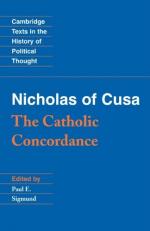|
This section contains 9,213 words (approx. 31 pages at 300 words per page) |

|
SOURCE: Hopkins, Jasper. Introduction to Nicholas of Cusa on Learned Ignorance: A Translation and an Appraisal of De Docta Ignorantia, pp. 1-43. Minneapolis, Minn.: Arthur J. Banning Press, 1981.
In this excerpt from his edition of De Docta Ignorantia, Hopkins explicates the Cusan concept of “Maximum Absolutum.” Hopkins also provides a brief introduction to the whole work and its emphasis on the human inability to know any given thing perfectly, although limited knowledge is possible.
A mélange of intellectual tension and excitement pervaded the Universities of Heidelberg, Padua, and Cologne, where Nicholas of Cusa (1401-64) studied in the early fifteenth century. The ecclesiastical clash between the competitive claimants to the papacy—a rivalry adjudicated by the powerful Council of Constance (1414-18)—had badly divided the faculties of law by engendering the dispute over the Conciliar Movement. Moreover, the theological faculties had scarcely adjusted to the prolonged debate between...
|
This section contains 9,213 words (approx. 31 pages at 300 words per page) |

|


